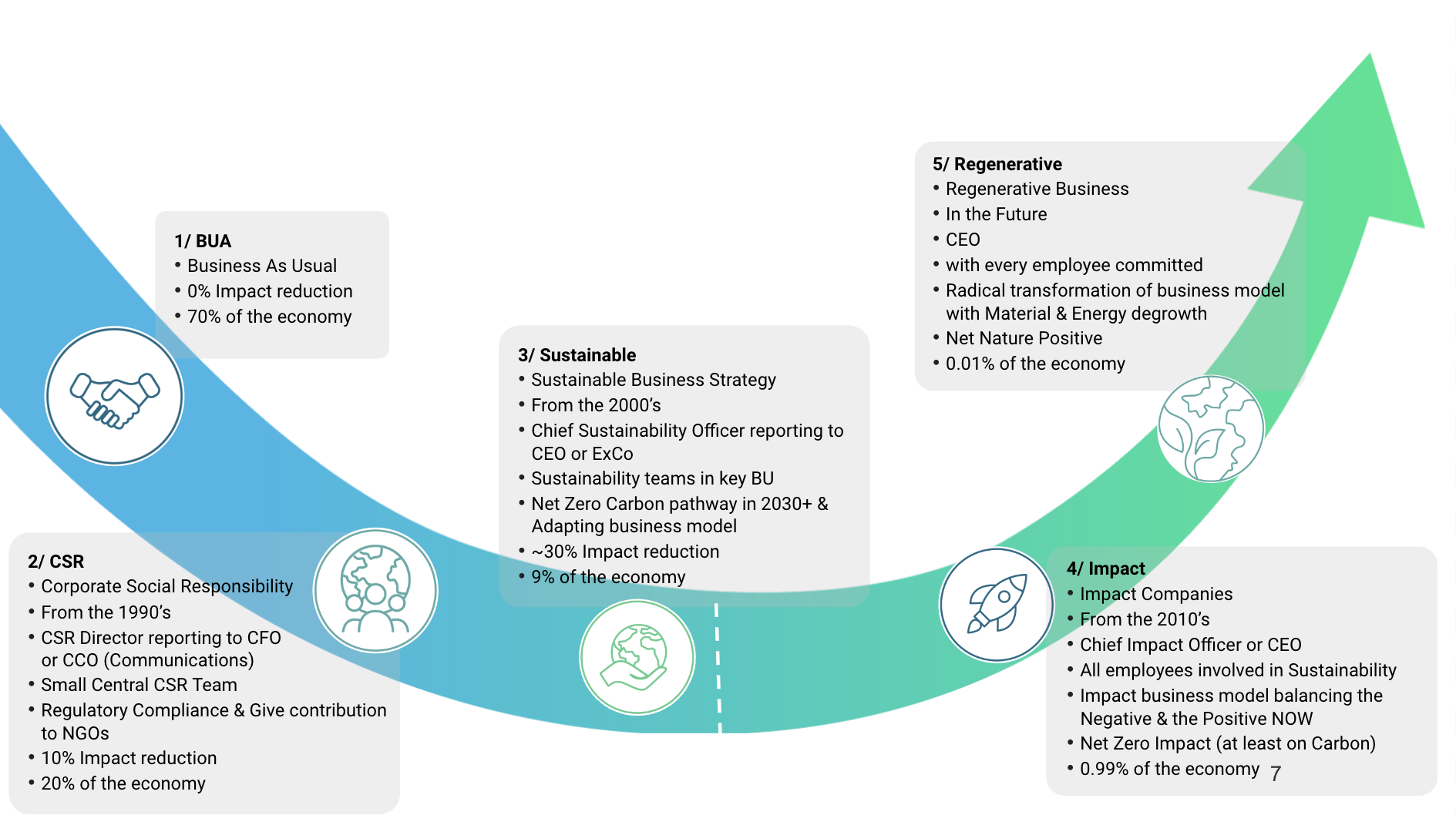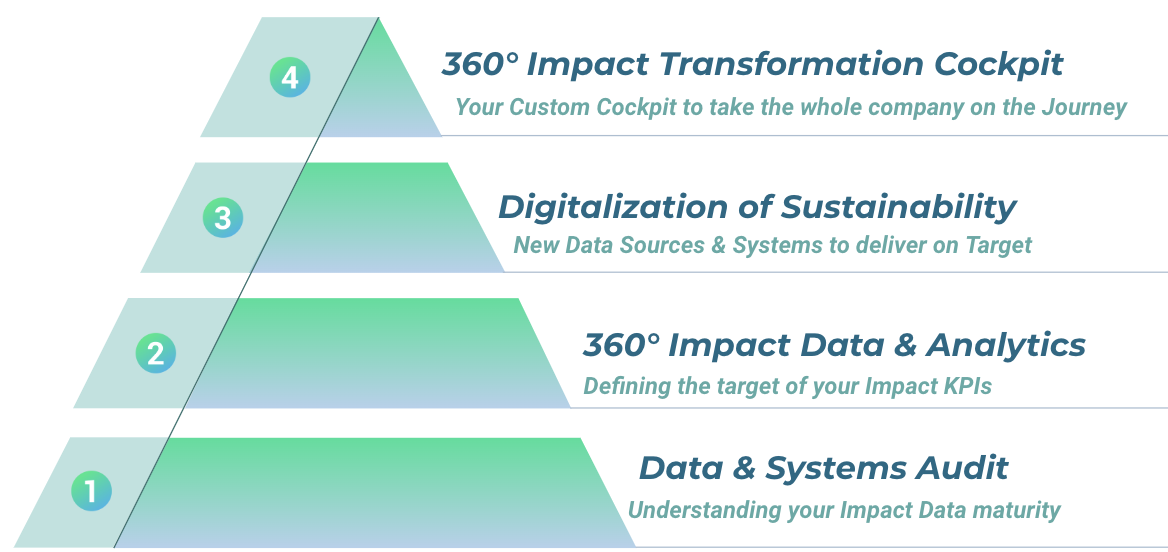
At Impact Labs, nature is the center of our actions. We aim to enact sustainable business transformation with measured significant positive impact, reshaping businesses to ultimately achieve a business model that contributes to nature regeneration. This next frontier is called nature positive business.
The loss of natural capital poses a serious risk to the functioning of societies and economies
Economic progress has been historically linked to the improvements in human welfare. However, there is a rational and ever-growing concern that the future of human welfare is highly compromised by the excessive resource consumption and pollution that are fueled by economic development.
During the 1970s, in the USA, anti-pollution and wetland protection policies are developed that resulted in the growth of “no net loss” (NNL) or “net positive impact” (NPI) discourses within corporations. Businesses started to recognize the need to carefully manage operational and reputational risks related to environmental degradation and biodiversity loss, resulting in an increase in targeted and measurable environmental goals. The commitments made by businesses in the scope of NNL/NPI are generally based on the mitigation hierarchy (avoid, minimize, restore, offset) and applied only to the direct operational impacts.

The shift towards a Nature Positive discourse is due to 2 main reasons:
-
- the growing recognition of the economic and financial risks of biodiversity loss
- the increase in data indicating that the direct operational impact of businesses is only a small share of the total biodiversity impacts
Despite the increase in business and policy rhetoric regarding the environmental impacts of economic activities, there is no evidence of progress in commitments nor in the development of strategies to achieve them. Measuring biodiversity in an accurate manner and its responses to business impacts is essential for nature-positive aligned actions. However, there is a need for metrics that can capture the biodiversity impacts along the whole value chain, based on high-quality spatially explicit data.
What does “Nature Positive” mean?
As with many environmental and sustainability concepts, the definition of “nature-positive” is yet to be consistent across stakeholders. The definition encompasses the following characteristics:
- A systems-thinking approach, where the outcomes are not just analyzed at the organizational level, but in the wider systematic context. In this way, interconnections between different sustainability goals are recognized and leveraged;
- A 360º scope approach, encompassing the operational footprint, supply chain and end-of-life impacts (vertical scope), and allowing for engagement in industry-wide sustainability improvement (horizontal scope);
- Implementation of clear methodological processes, rooted in sustainability and aligned with an ecologically healthy future;
- A proactive and restorative approach focused on the conservation and regeneration of ecosystems.
This way, a nature positive activity is in alignment with the traditional concepts of a regenerative economy, supporting the idea that manufactured capital and its activities should support the regeneration of natural capital.
How can data fuel Nature Positivity?
Environmental monitoring is a key factor to achieve nature positivity, as it gives information to assess the current condition and to strategically plan for the future. It allows us to derive knowledge from processes and the components of the processes. But more importantly, to better understand the natural environment and to successfully minimize the negative impacts of human activity. The benefits of environmental monitoring spread over the social, economic, and governmental aspects, highlighting the need for good quality data to support decision-making processes, and to establish baselines and trends.
Impact Labs consulting solutions are based on a nature-positive and data-driven approach that aims to deliver Sustainable Business Growth, Net Positive Impact, and resilience for companies that are ready and willing to transform.
Working with clients for Digitalization is key to achieving a nature-positive transformation, that will be materialized through active contributions to the regeneration of nature.
Clients such as PUR solidify our Nature Positive character. PUR works with over 150 companies across 40 countries to regenerate ecosystems while empowering local communities to operate long-term socio-environmental projects including agroforestry, land preservation, and sustainable agricultural practices.
Impact Labs helped PUR defining a strong data and digital strategy to drive growth, sourcing the right tech and science partners to strengthen market position, and digitalizing the whole value chain.

Impact Labs consulting solutions are based on a nature-positive and data-driven approach that aims to deliver Sustainable Business Growth, Net Positive Impact and resilience for Companies that are ready and willing to Transform, guided by a strong sense of Purpose & pioneering Leaders. Moving into the Doughnut Economics: from Shareholder to Stakeholder Capitalism.
To learn more about our offer, visit our Consulting Solutions.
Listen to our podcast, Reboot Business, hosted by Julien Devaureix
References
Barros, Laima. (2023) Remote Sensing for Monitoring of Nature Positive Initiatives (Unpublished Environmental Engineering Master Thesis). NOVA School of Science and Technology, Lisbon.
AIE. (2021). Why Is It Important to Monitor Environmental Data? https://www.assetintegrityengineering.com/why-is-it-important-to-monitor-environmental-data/
IUCN. (2015). No Net Loss and Net Positive Impact Approaches for Biodiversity. https://portals.iucn.org/library/sites/library/files/documents/2015-003-Summ.pdf
SEEA. (n.d.). Natural Capital and Ecosystem Services FAQ. Retrieved March 31, 2023, from https://seea.un.org/content/natural-capital-and-ecosystem-services-faq#What are ecosystem services?
zu Ermgassen, S. O. S. E., Howard, M., Bennun, L., Addison, P. F. E., Bull, J. W., Loveridge, R., Pollard, E., & Starkey, M. (2022). Are corporate biodiversity commitments consistent with delivering ‘nature-positive’ outcomes? A review of ‘nature-positive’ definitions, company progress and challenges. Journal of Cleaner Production, 379(P2), 134798. https://doi.org/10.1016/j.jclepro.2022.134798
Impact Labs CSRD Offer
We are happy to introduce our tailored CSRD service offer, designed to simplify compliance with the new regulations and drive impactful sustainability strategies. This way, teams can focus on reducing their footprint and developing effective nature strategies.
We streamline the CSRD reporting process with relevant tech and tools to make it as smooth and efficient as possible. Our service is designed to guide you through every step of this transformative journey.
Checklist on 10 key aspects to consider when selecting a CSRD Tool
Selecting the right technology for implementing the Corporate Sustainability Reporting Directive (CSRD) involves several key considerations to ensure compliance, efficiency, and effectiveness.
#REBOOT Business 12 – Une Economie Plus Juste
EPISODE SUMMARYAu fil des podcasts Reboot se dessine une ligne convergente vers l’urgence impérieuse de changer le système dans sa globalité. C’est...





